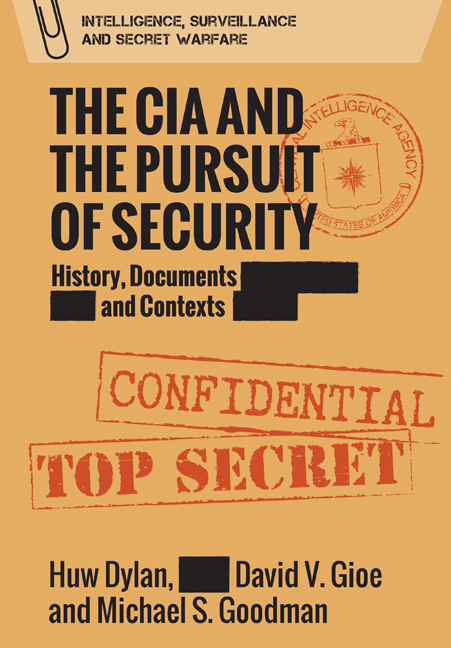Book contents
- Frontmatter
- Contents
- List of Documents
- Foreword
- Acknowledgements
- Introduction
- 1 Intelligence for an American Century: Creating the CIA
- 2 The Development of CIA Covert Action
- 3 A ‘Gangster Act’: The Berlin Tunnel
- 4 The CIA and the USSR: The Challenge of Understanding the Soviet Threat
- 5 Anglo-American Intelligence Liaison and the Outbreak of the Korean War
- 6 The CIA and the Bomber and Missile Gap
- 7 The CIA and Cuba: The Bay of Pigs and the Cuban Missile Crisis
- 8 The CIA in Vietnam
- 9 The CIA and Arms Control
- 10 The CIA’s Counter-Intelligence Conundrum: The Case of Yuri Nosenko
- 11 1975: The Year of the ‘Intelligence Wars’
- 12 Watching Khomeini
- 13 The CIA and the Soviet Invasion of Afghanistan
- 14 Martial Law in Poland
- 15 Able Archer and the NATO War Scare
- 16 The Soviet Leadership and Kremlinology in the 1980s
- 17 The CIA and the (First) Persian Gulf War
- 18 A Mole in Their Midst: The CIA and Aldrich Ames
- 19 ‘The System was Blinking Red’: The Peace Dividend and the Road to 9/11
- 20 Reckoning and Redemption: The 9/11 Commission, the Director of National Intelligence and the CIA at War
- 21 The ‘Slam Dunk’: The CIA and the Invasion of Iraq
- 22 The Terrorist Hunters Become Political Quarry: The CIA and Rendition, Detention and Interrogation
- 23 Innovation at the CIA: From Sputnik to Silicon Valley and Venona to Vault 7
- 24 Entering the Electoral Fray: The CIA and Russian Meddling in the 2016 Election
- 25 Flying Blind? The CIA and the Trump Administration
- Bibliography
- Index
3 - A ‘Gangster Act’: The Berlin Tunnel
Published online by Cambridge University Press: 24 September 2020
- Frontmatter
- Contents
- List of Documents
- Foreword
- Acknowledgements
- Introduction
- 1 Intelligence for an American Century: Creating the CIA
- 2 The Development of CIA Covert Action
- 3 A ‘Gangster Act’: The Berlin Tunnel
- 4 The CIA and the USSR: The Challenge of Understanding the Soviet Threat
- 5 Anglo-American Intelligence Liaison and the Outbreak of the Korean War
- 6 The CIA and the Bomber and Missile Gap
- 7 The CIA and Cuba: The Bay of Pigs and the Cuban Missile Crisis
- 8 The CIA in Vietnam
- 9 The CIA and Arms Control
- 10 The CIA’s Counter-Intelligence Conundrum: The Case of Yuri Nosenko
- 11 1975: The Year of the ‘Intelligence Wars’
- 12 Watching Khomeini
- 13 The CIA and the Soviet Invasion of Afghanistan
- 14 Martial Law in Poland
- 15 Able Archer and the NATO War Scare
- 16 The Soviet Leadership and Kremlinology in the 1980s
- 17 The CIA and the (First) Persian Gulf War
- 18 A Mole in Their Midst: The CIA and Aldrich Ames
- 19 ‘The System was Blinking Red’: The Peace Dividend and the Road to 9/11
- 20 Reckoning and Redemption: The 9/11 Commission, the Director of National Intelligence and the CIA at War
- 21 The ‘Slam Dunk’: The CIA and the Invasion of Iraq
- 22 The Terrorist Hunters Become Political Quarry: The CIA and Rendition, Detention and Interrogation
- 23 Innovation at the CIA: From Sputnik to Silicon Valley and Venona to Vault 7
- 24 Entering the Electoral Fray: The CIA and Russian Meddling in the 2016 Election
- 25 Flying Blind? The CIA and the Trump Administration
- Bibliography
- Index
Summary
Berlin has rightly been at the heart of every serious study of the Cold War. Germany's divided capital had strategic importance beyond any other foreign capital. Though military lines had ossified into a series of potential battlegrounds with border checkpoints, and a foreboding wall with watch towers sprouted where families once freely crossed, intelligence operations were much more fluid. As Richard Aldrich observed, ‘the Cold War was fought, above all, by the intelligence services.’ Intelligence officers from many countries found themselves in both East and West Berlin attempting to discern the next move of the North Atlantic Treaty Organization (NATO) and the Warsaw Pact. David E. Murphy, a former Chief of CIA's Berlin Base, and his unlikely co-author, former KGB Officer Sergei Kondrashev, characterised the city as a ‘battleground’ of enormous importance.
If the battleground was enormous, so were the audacity and scale of intelligence collection efforts within it. Between 1952 and 1956 the CIA and its partner, the British SIS, undertook the largest data exfiltration operation from a single point of presence in the pre-cyber era. The Berlin Tunnel, whose daring matched its logistical and technological complexity, was codenamed Operation Gold by the Americans and Stopwatch by the British. Its primary purpose was to discern indications and warning that would suggest the Soviets were planning a military invasion of Western Europe. The roots of the operation, however, were in the failure of another signals intelligence operation.
As world war turned to Cold War, both East and West refitted their intelligence machinery for the contest to come. In October 1948, the USSR clamped down on the poor information assurance practice of multiple uses of one-time pads to encrypt sensitive information before transmission thanks to the betrayal of William Weisband, a Soviet MGB (forerunner of the KGB) agent in the Russian section of the US Army's Security Agency (succeeding the Army Signals Intelligence Service) at Arlington Hall. In the context of the national emergency in the Soviet Union during its so-called Great Patriotic War, this vulnerability created by the one-time pads was perhaps understandable, but afterwards the Soviets readopted more systematic information security procedures to safeguard their most sensitive global intelligence operations.
- Type
- Chapter
- Information
- The CIA and the Pursuit of SecurityHistory, Documents and Contexts, pp. 54 - 63Publisher: Edinburgh University PressPrint publication year: 2020



